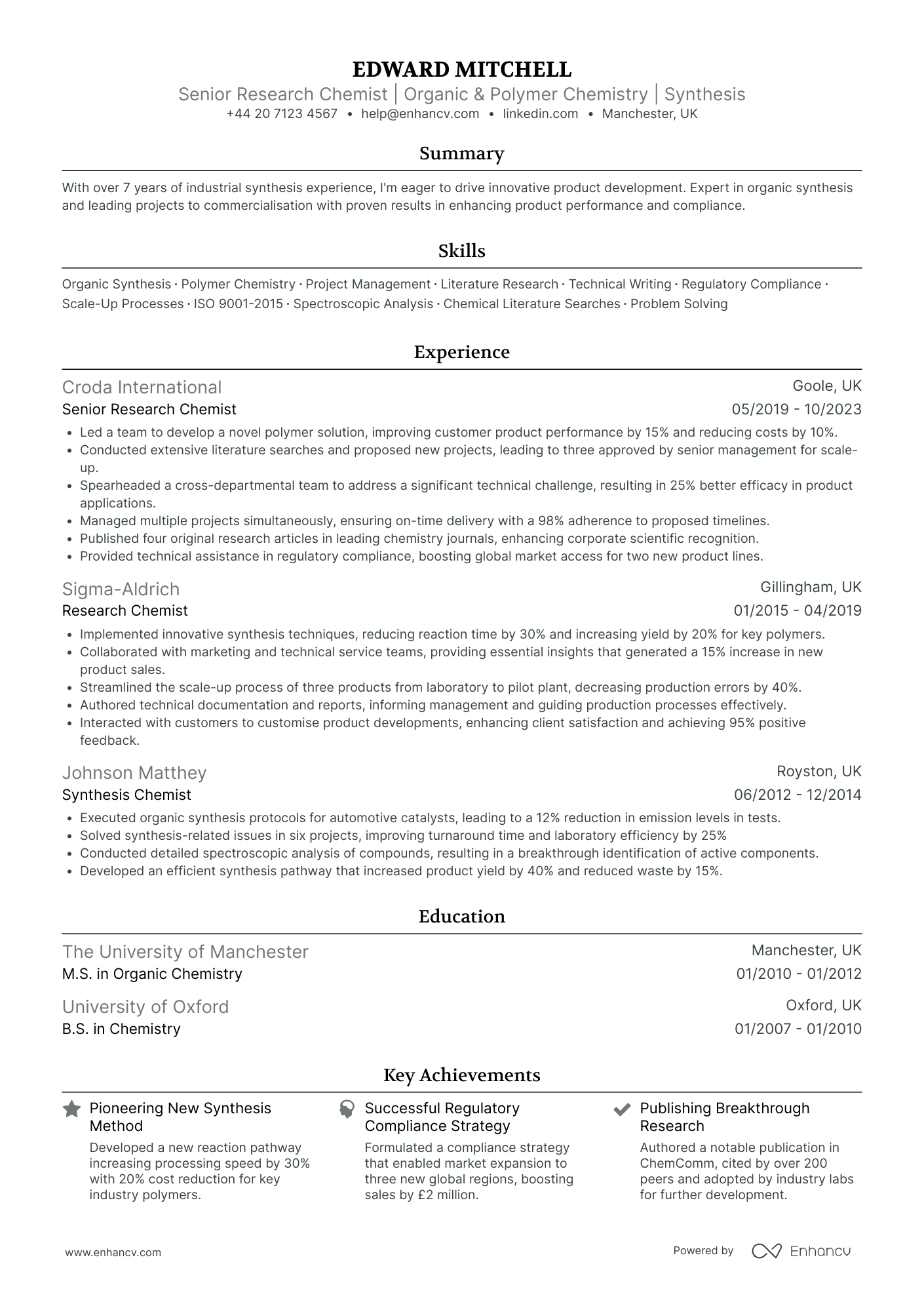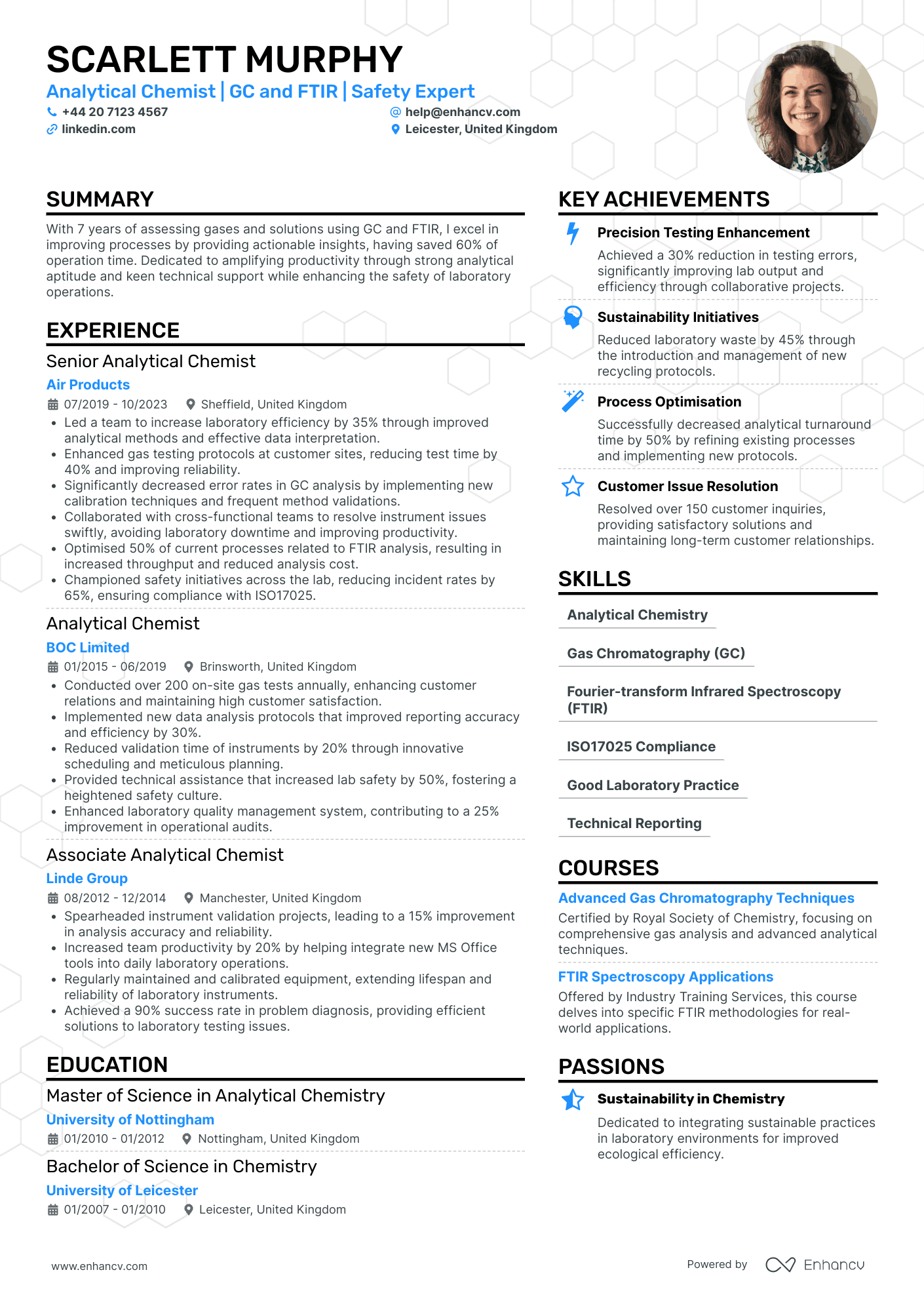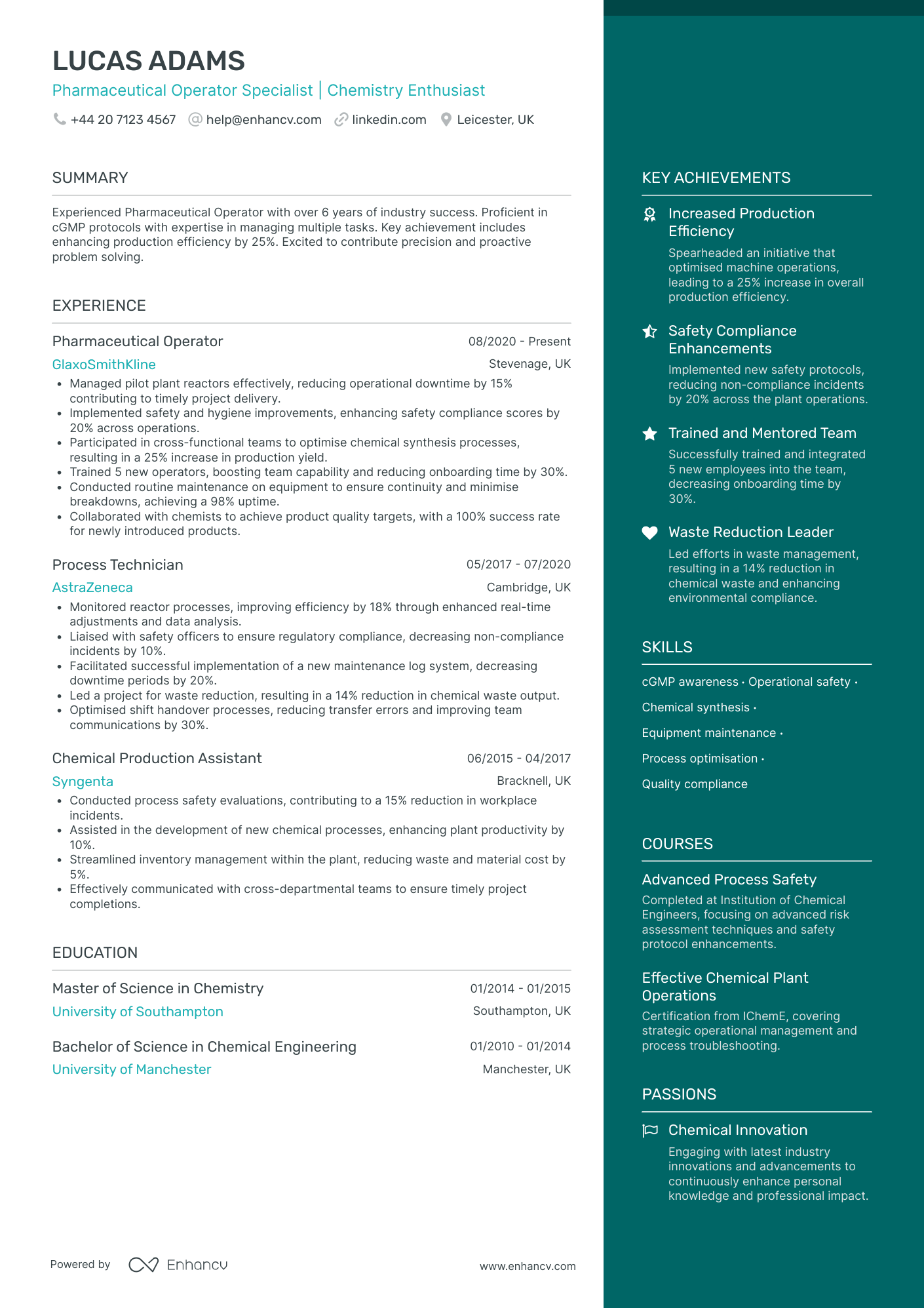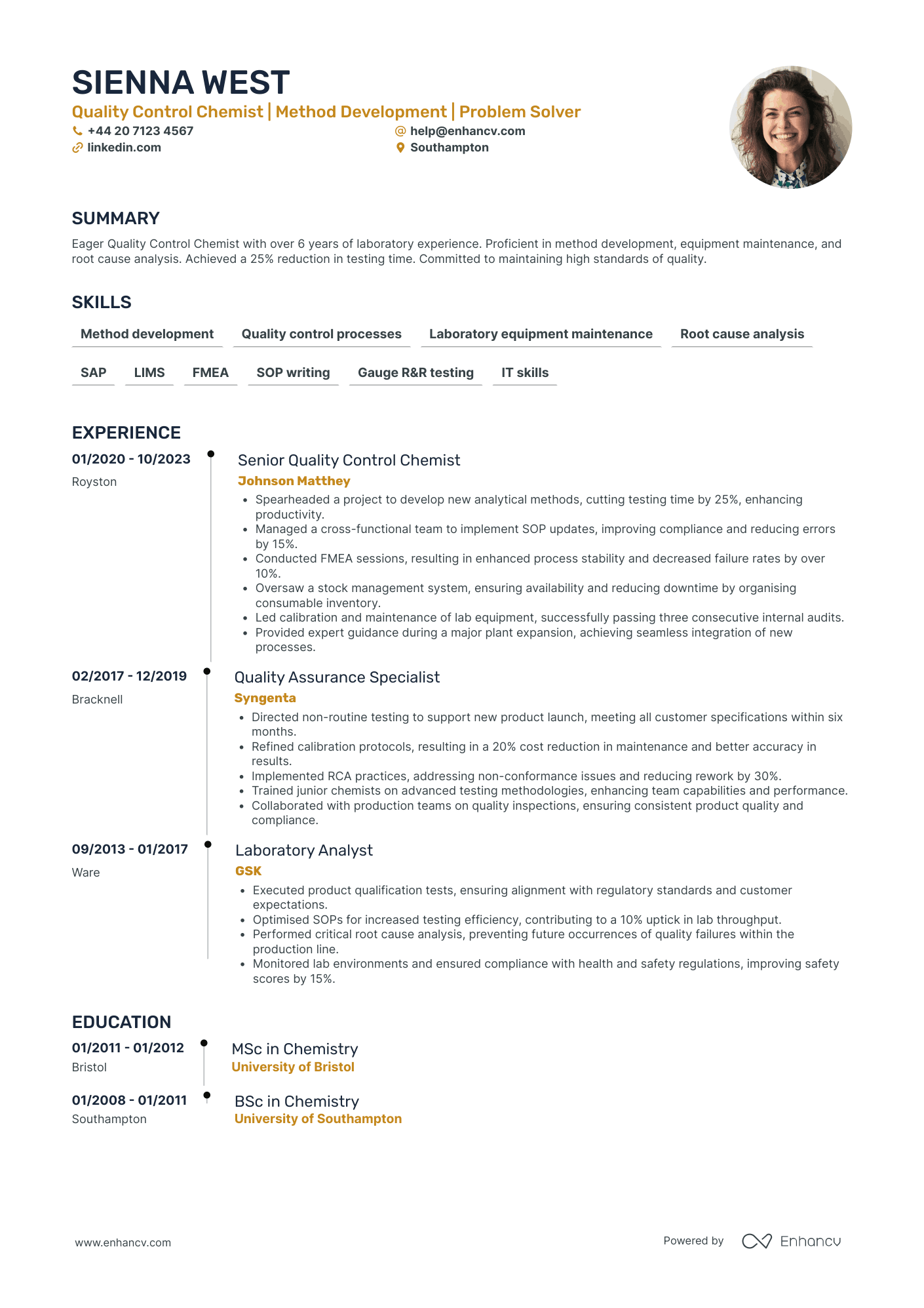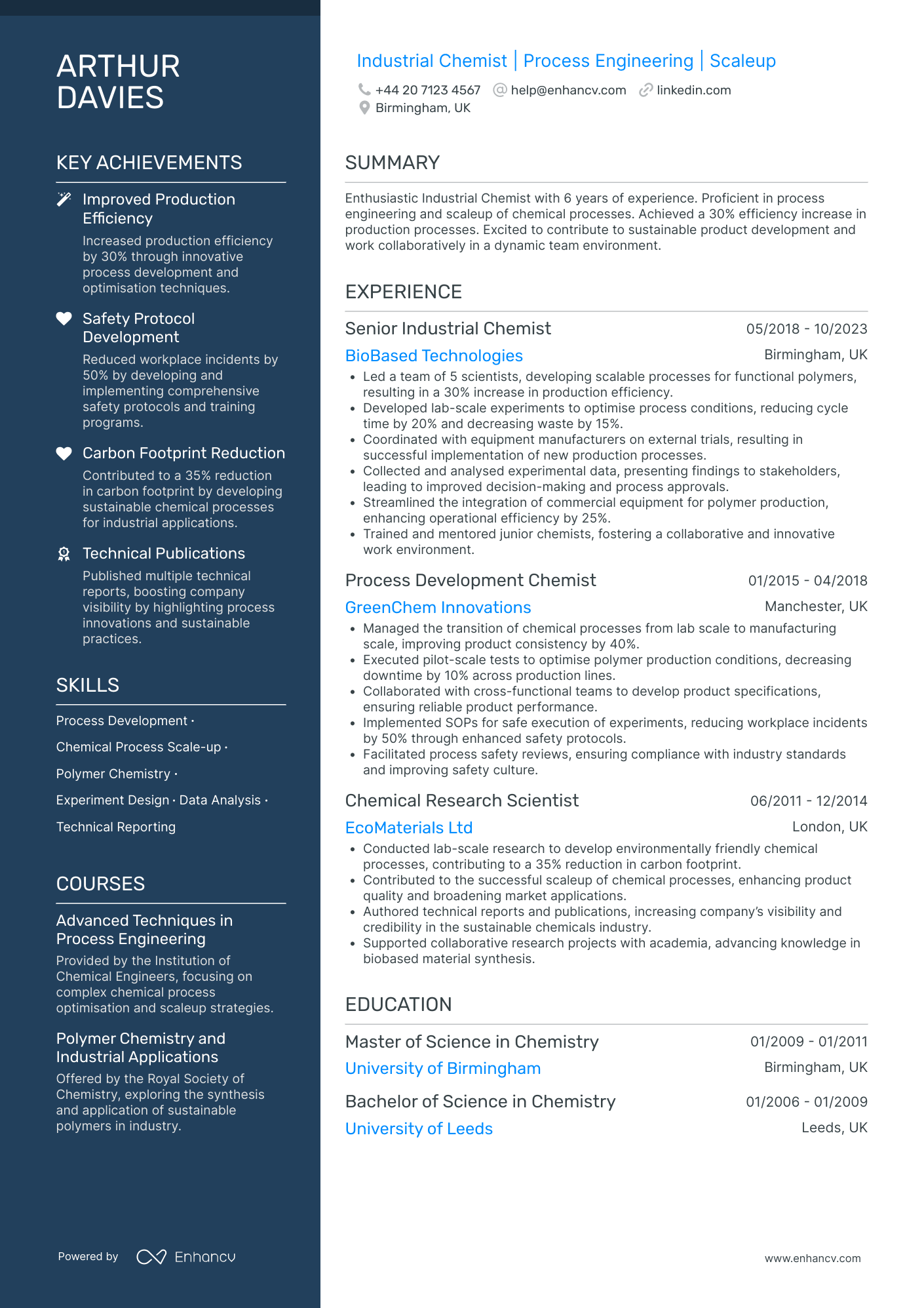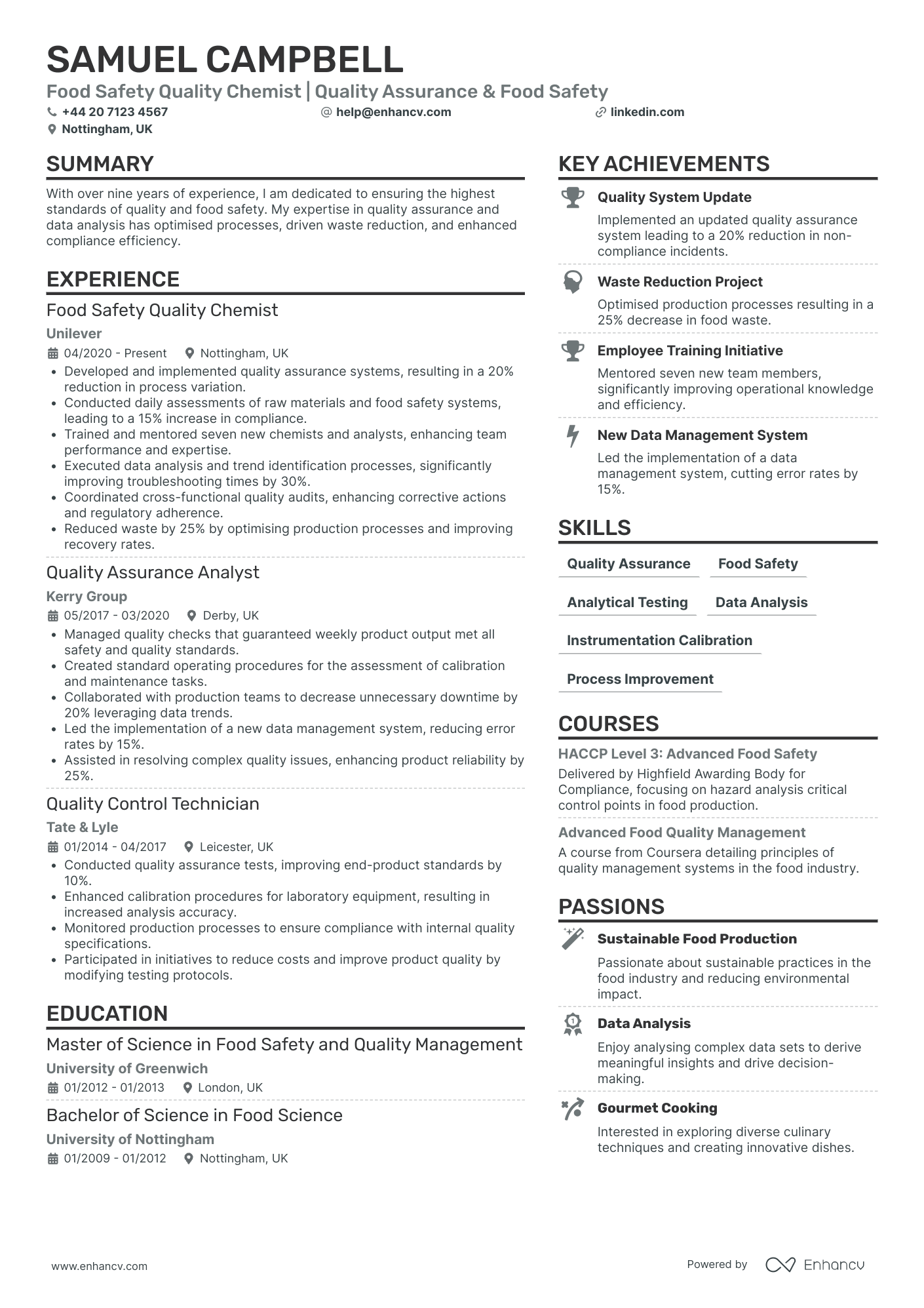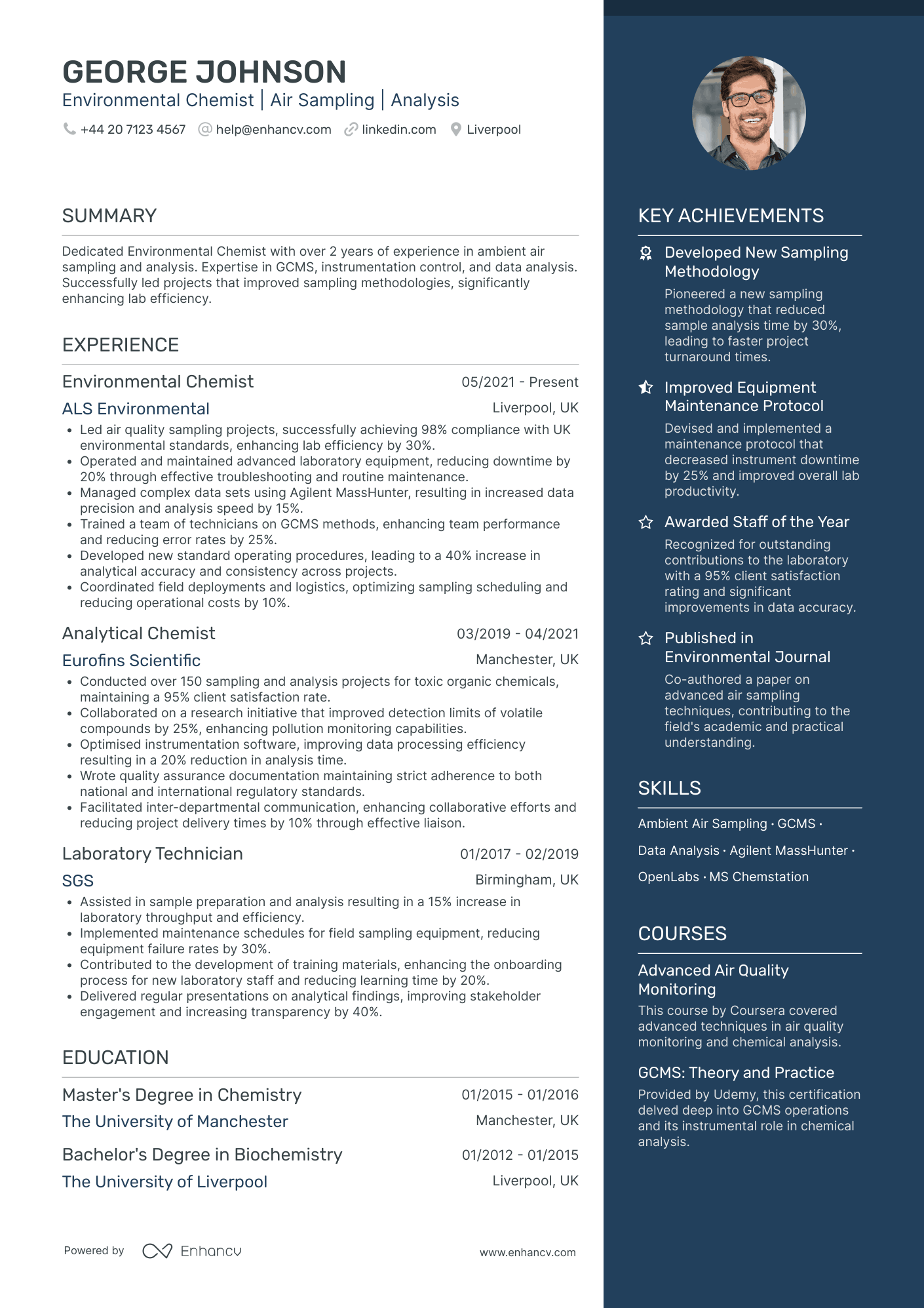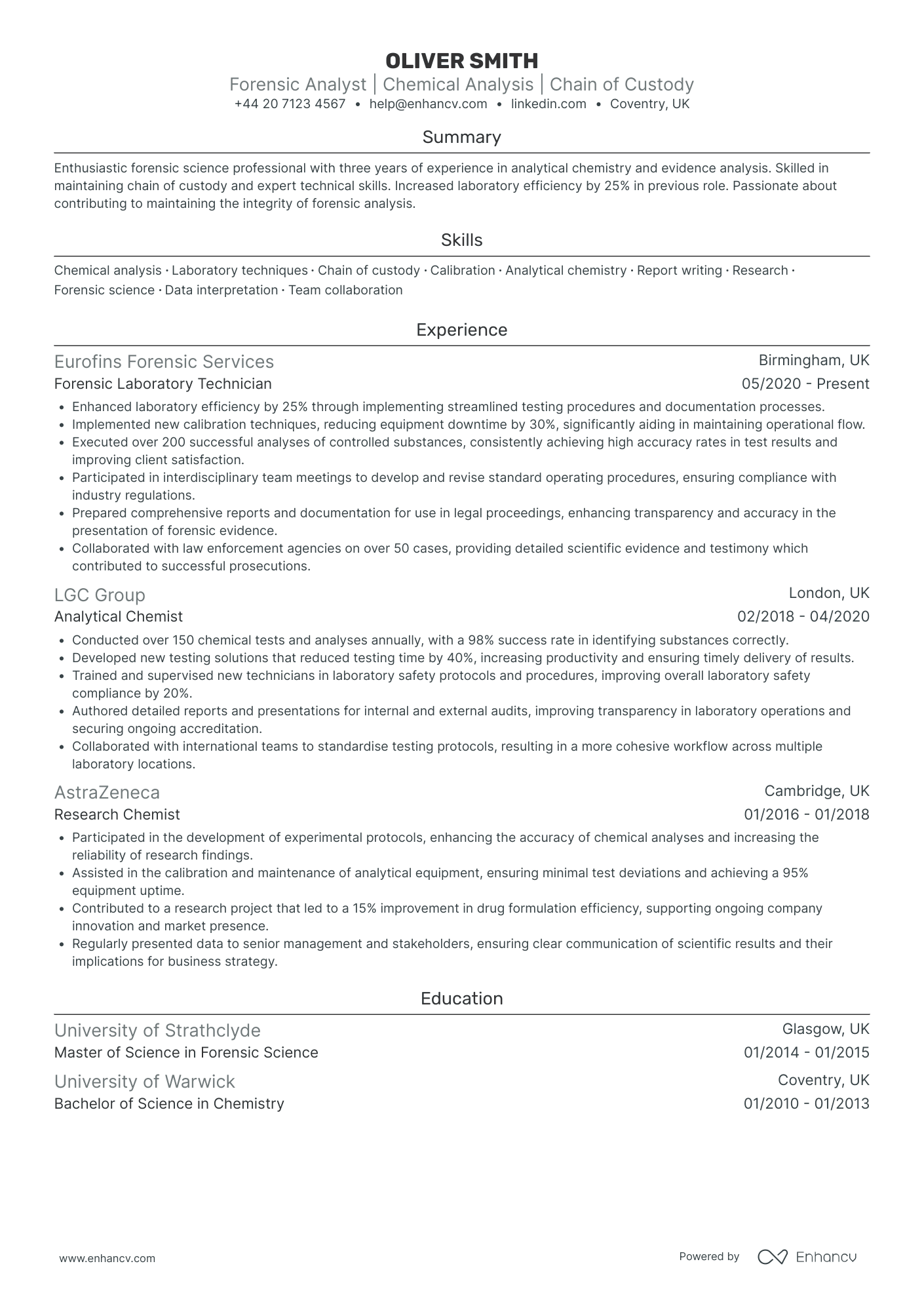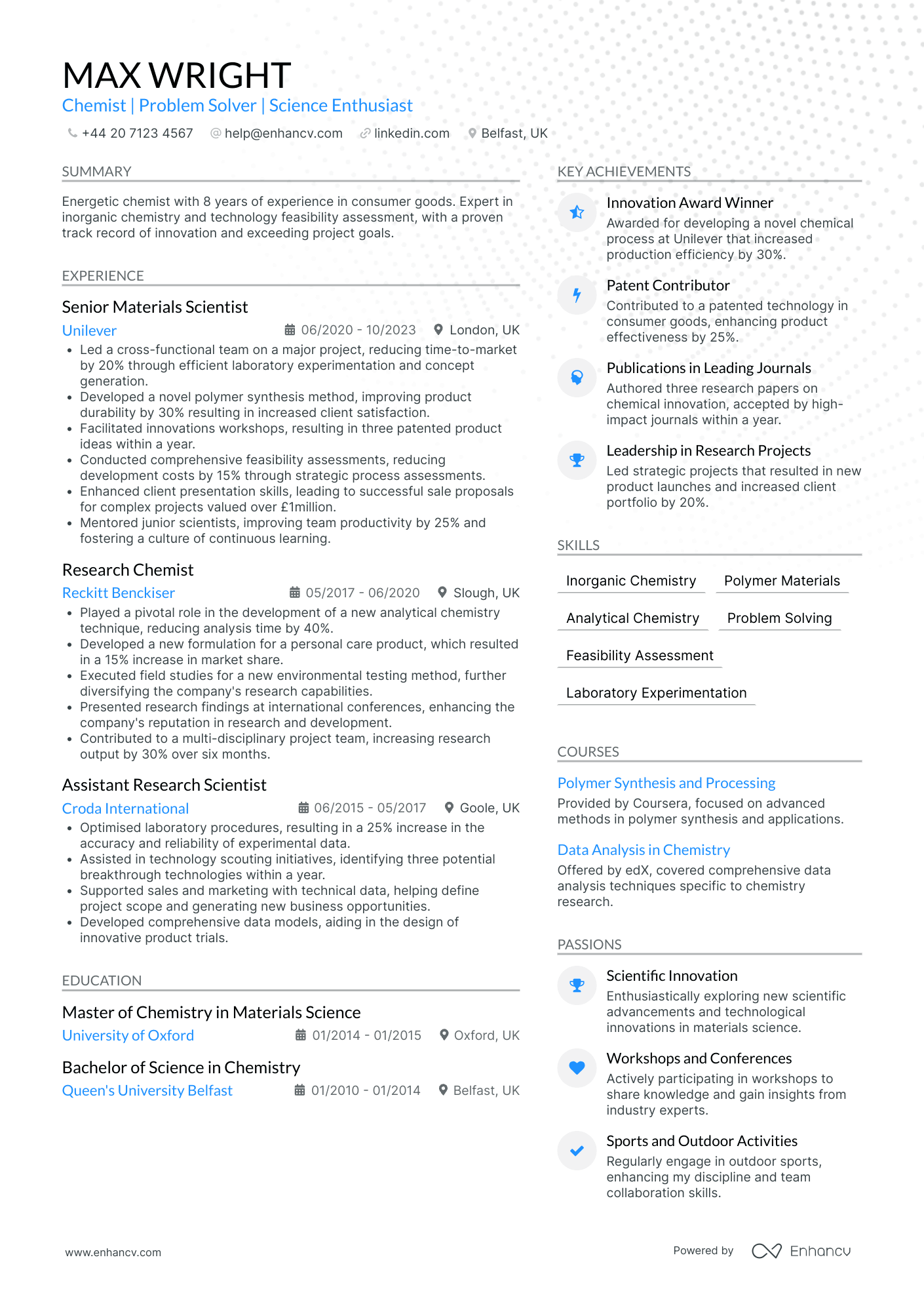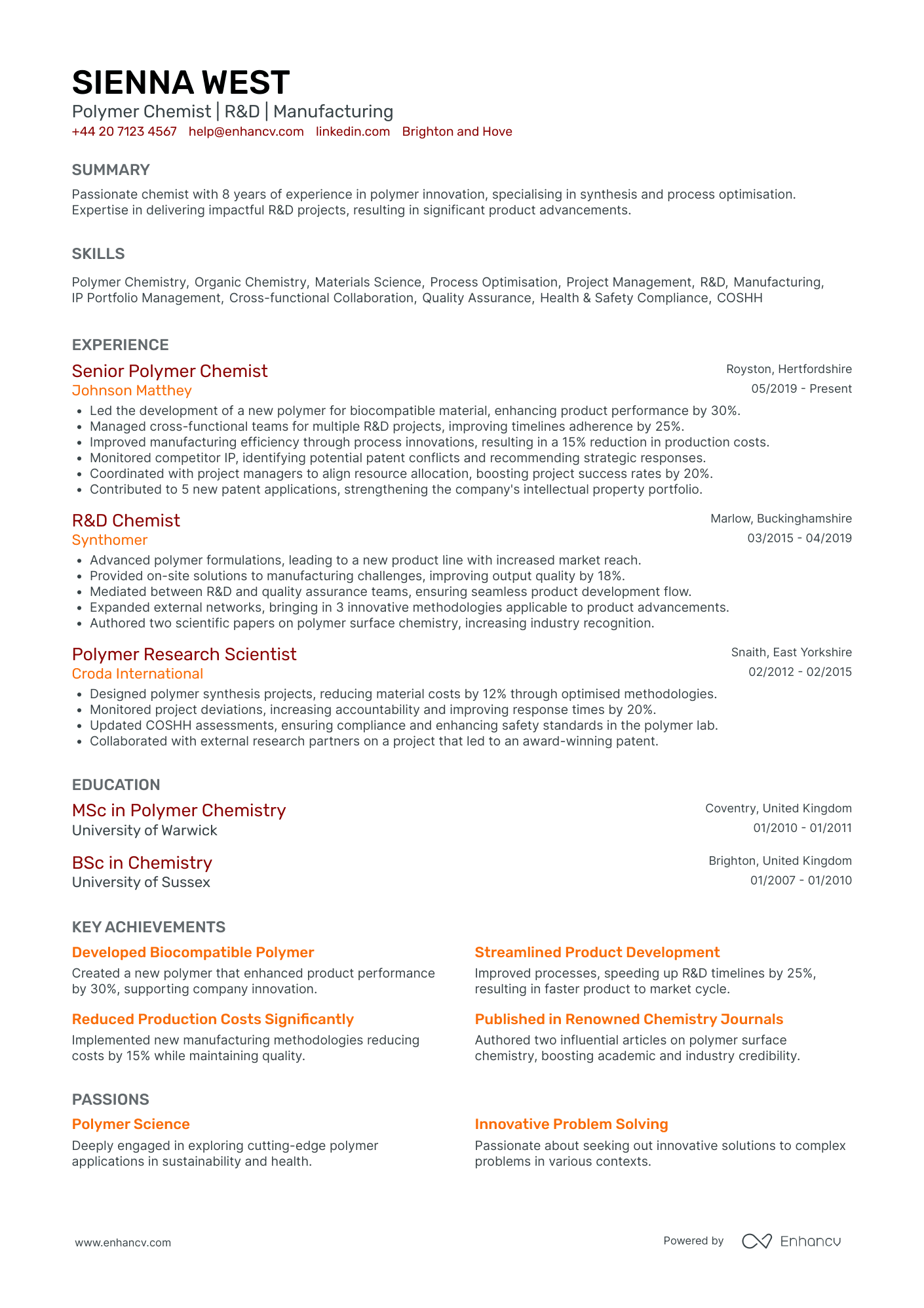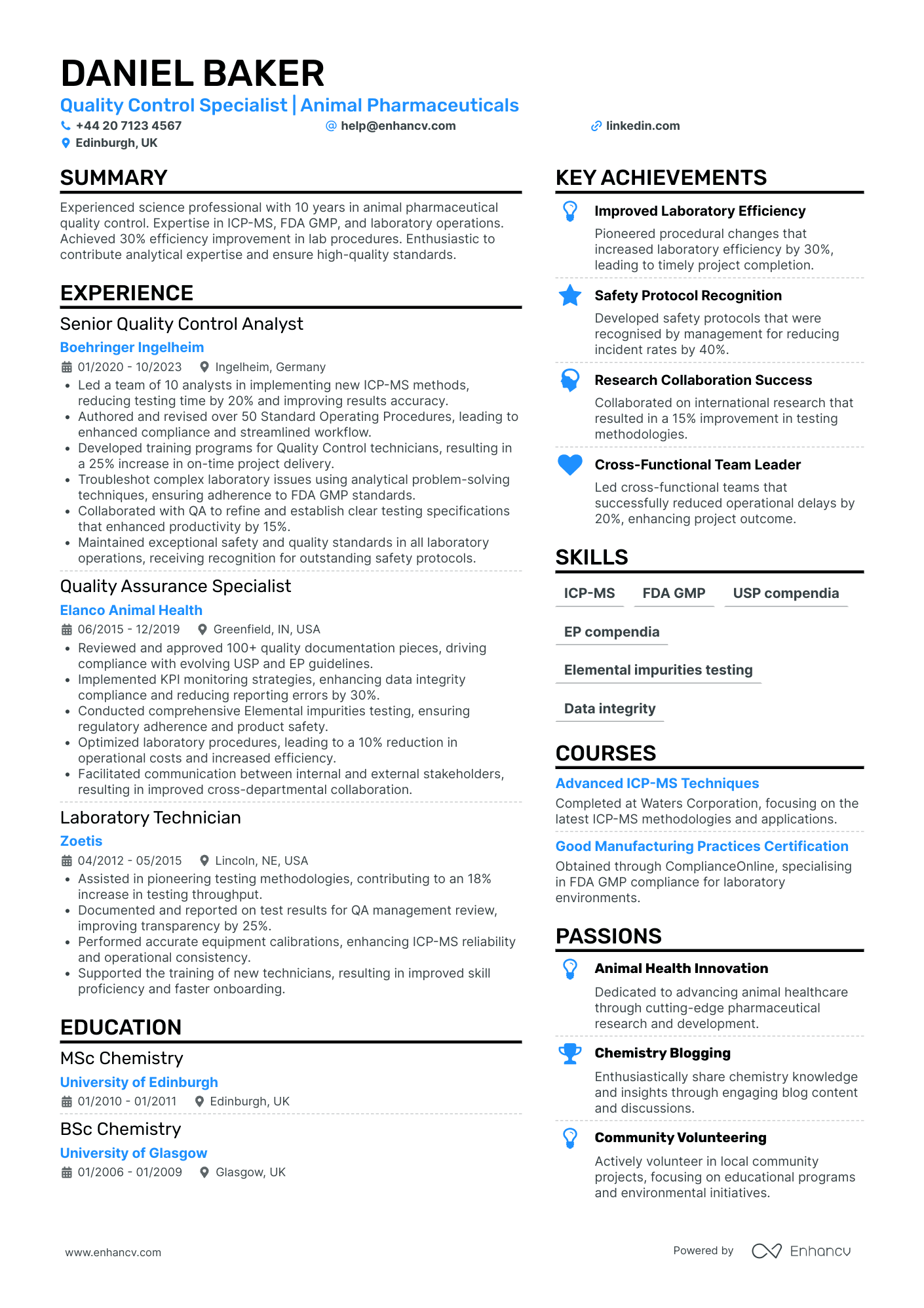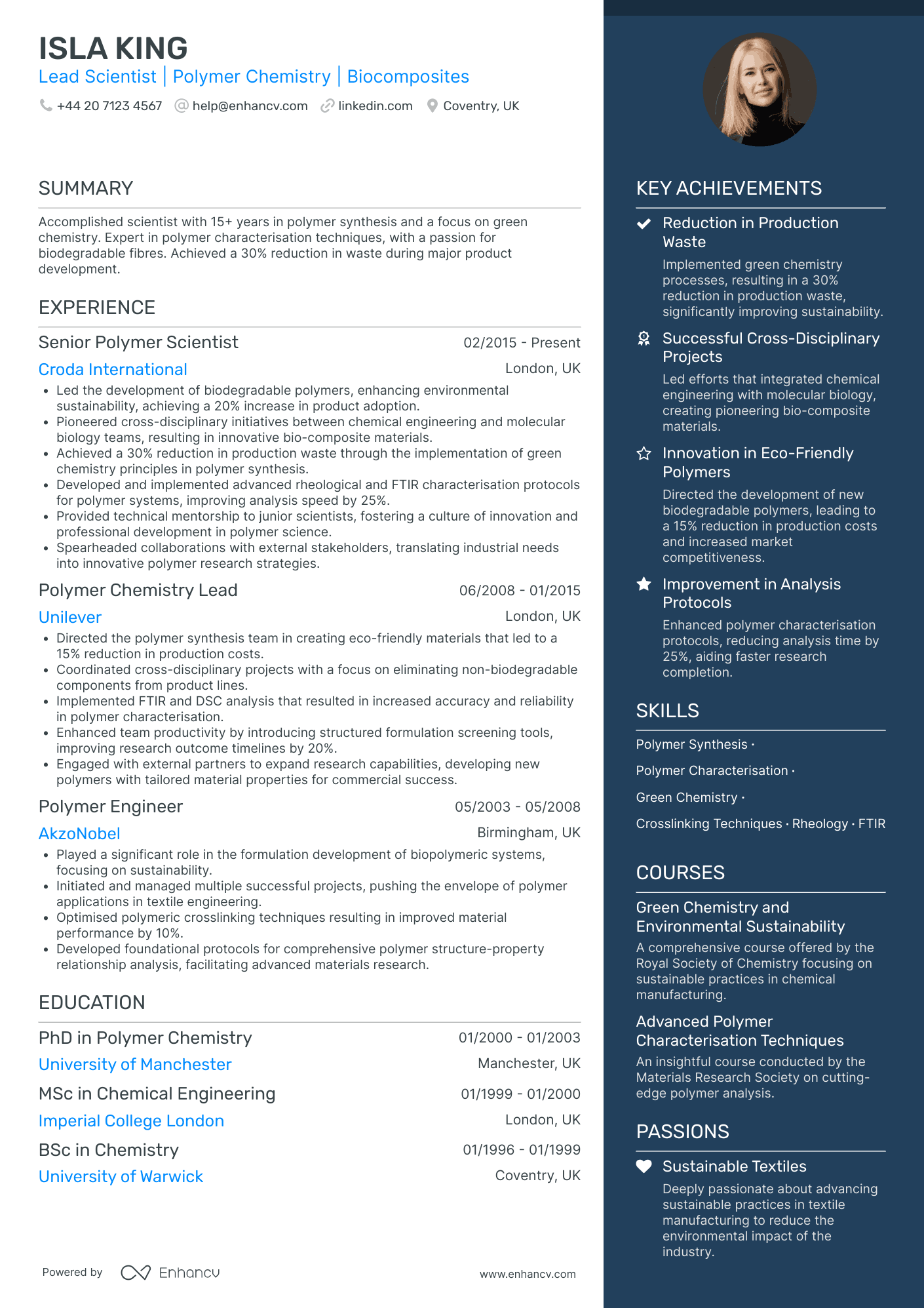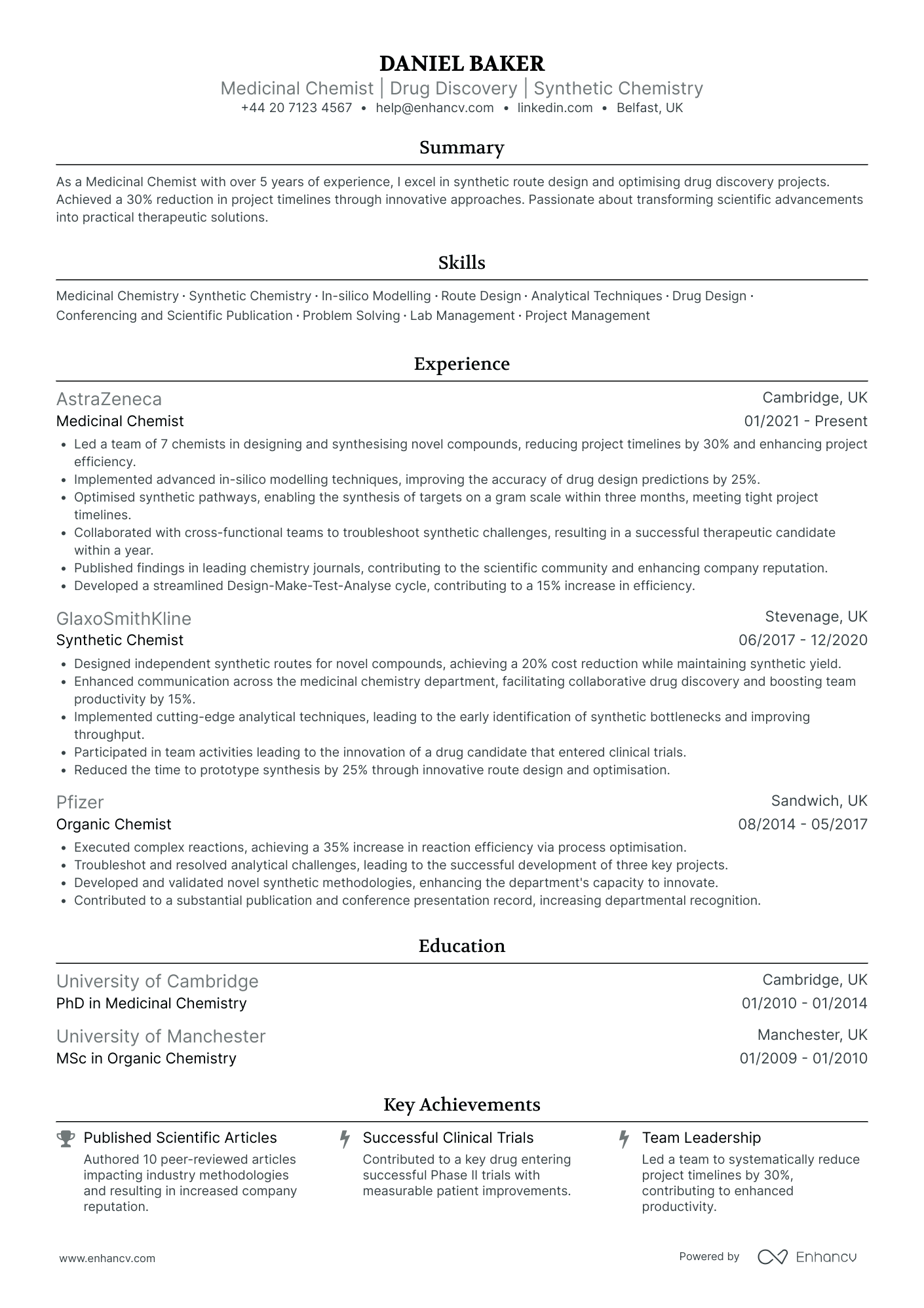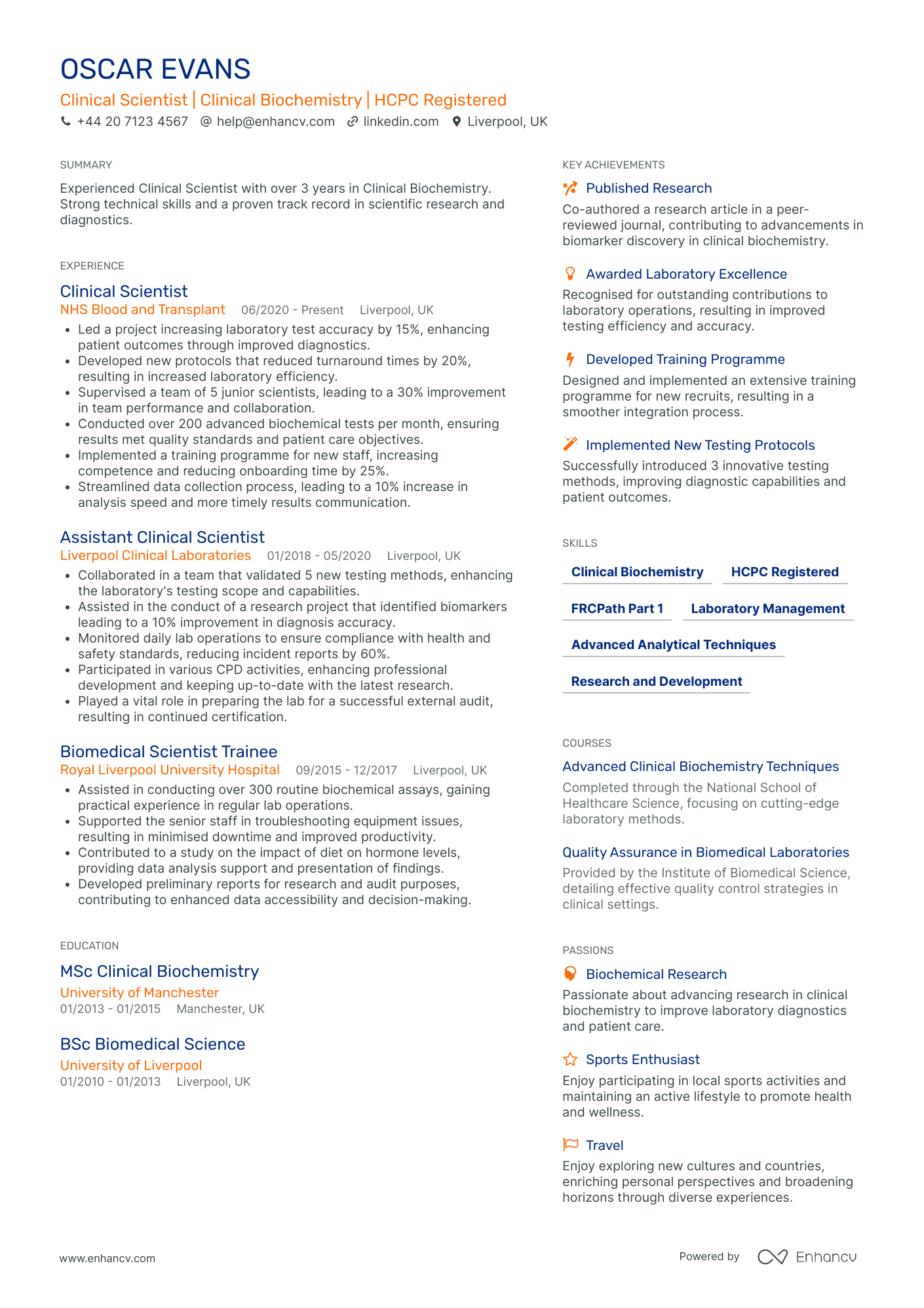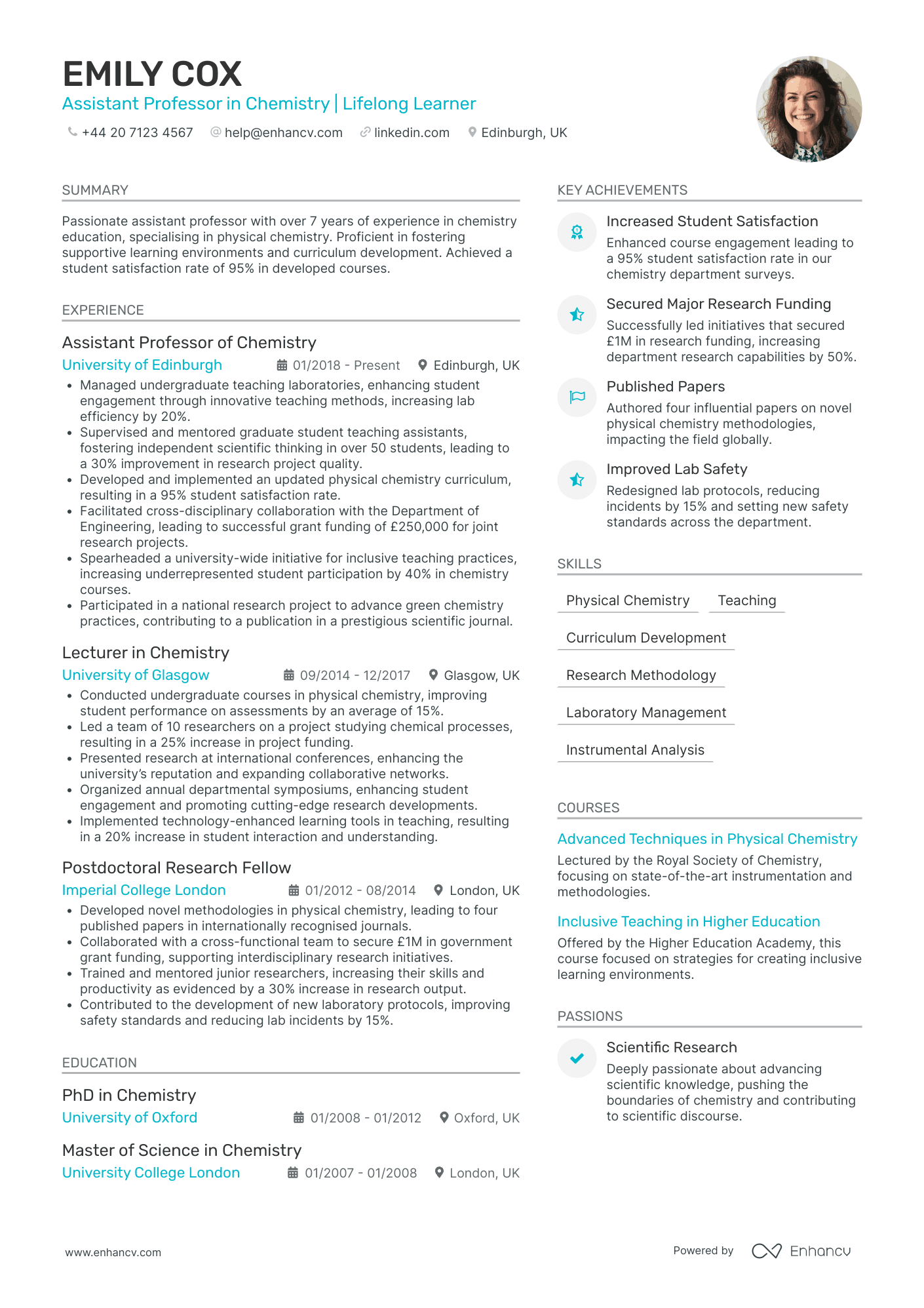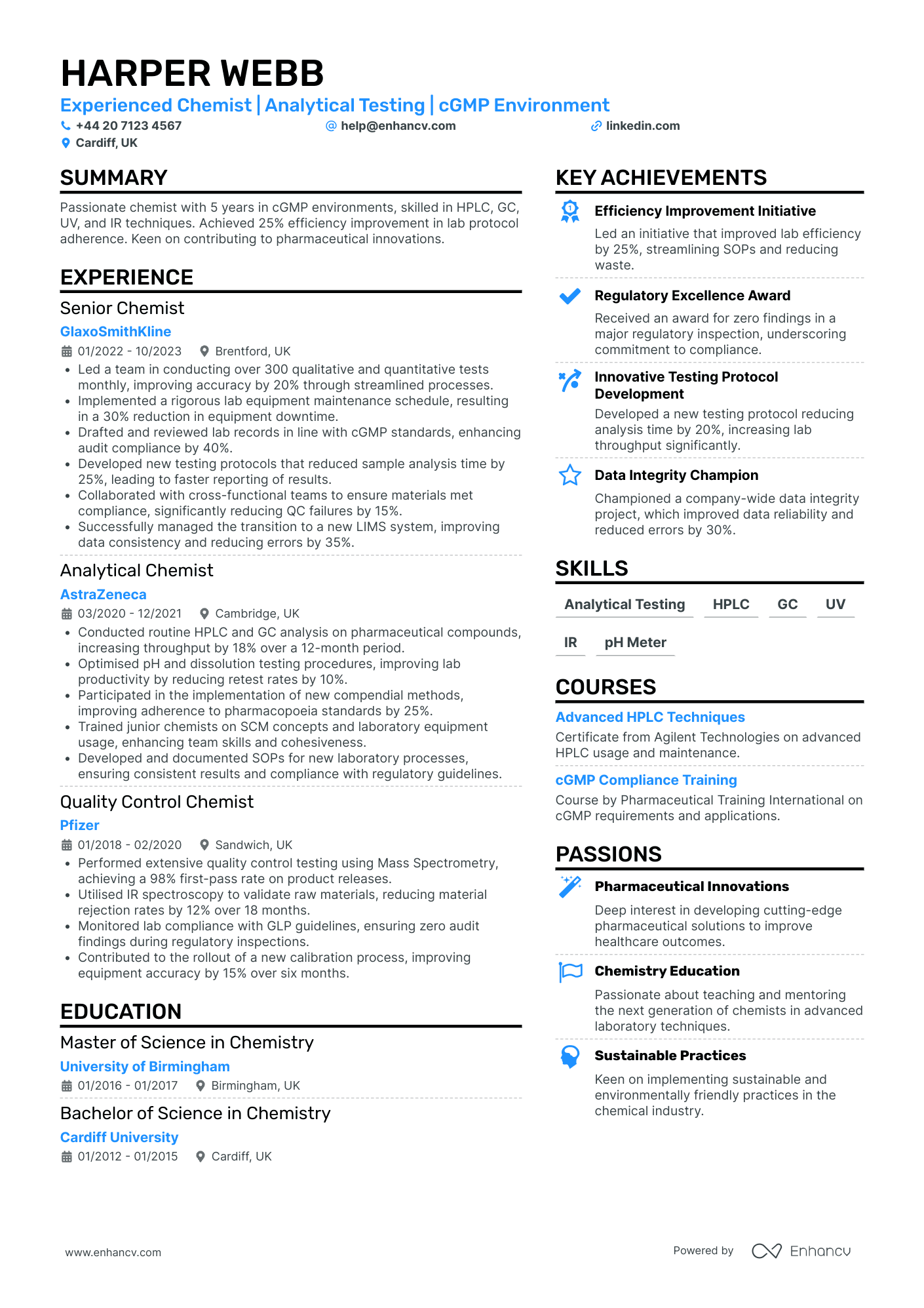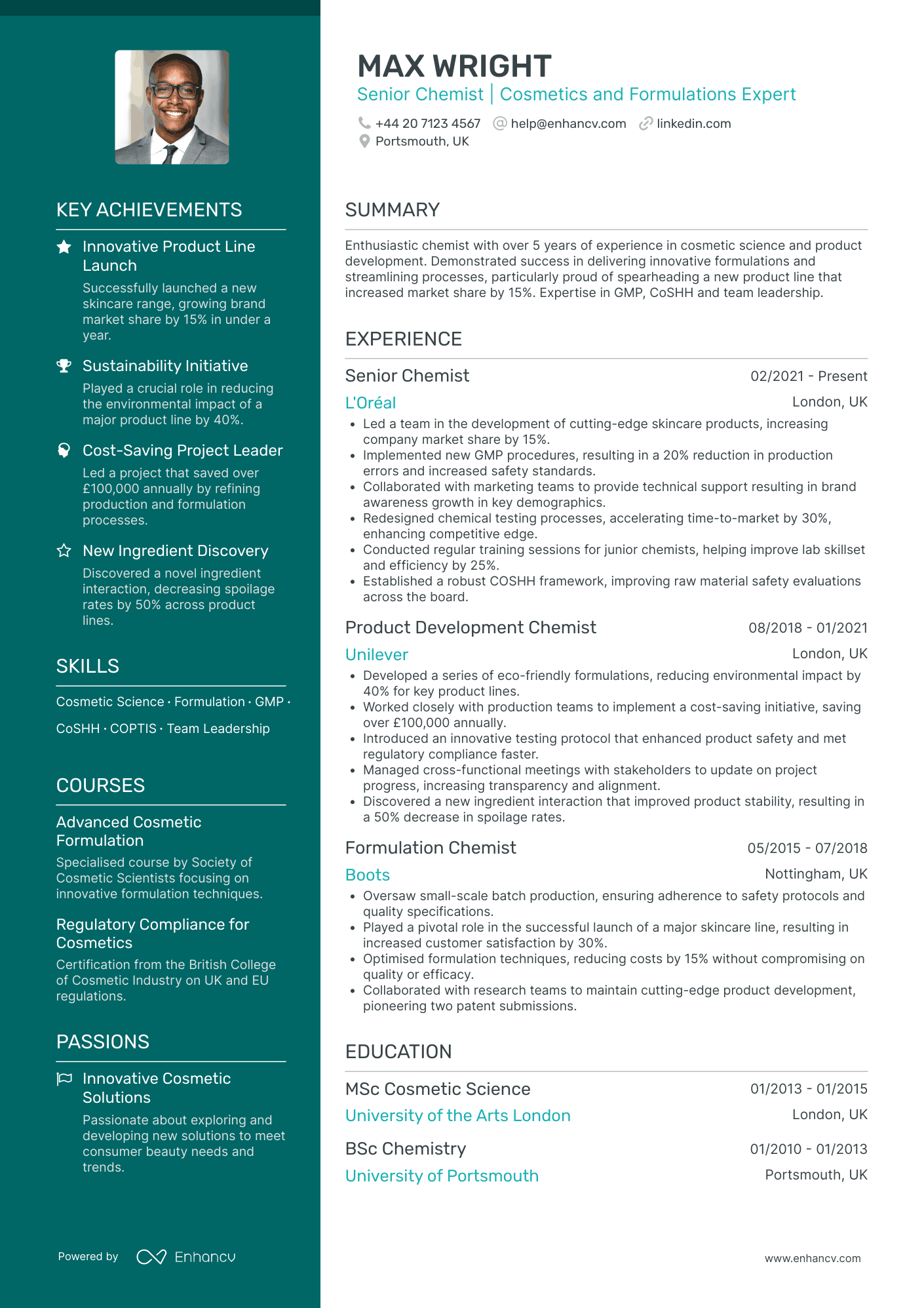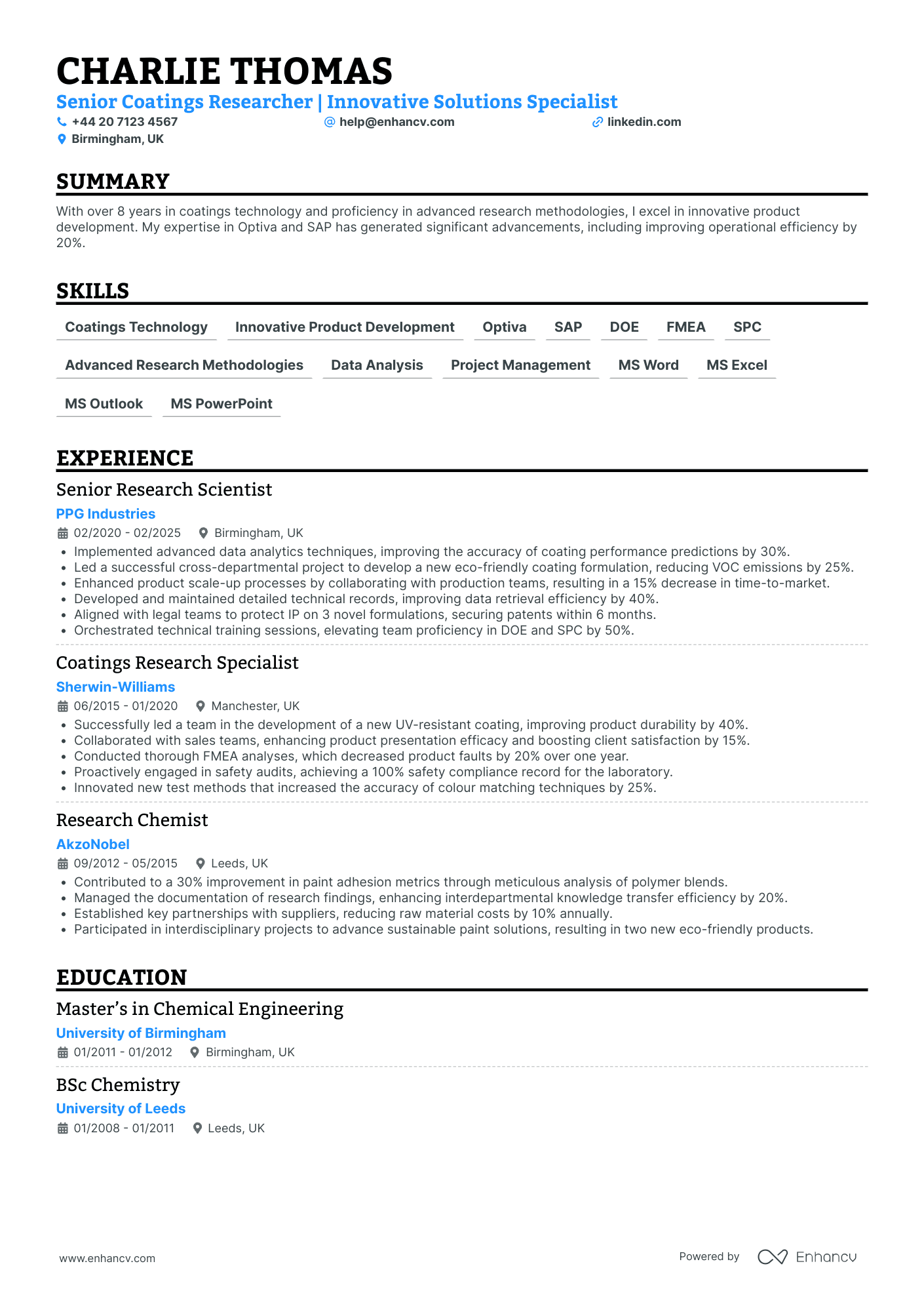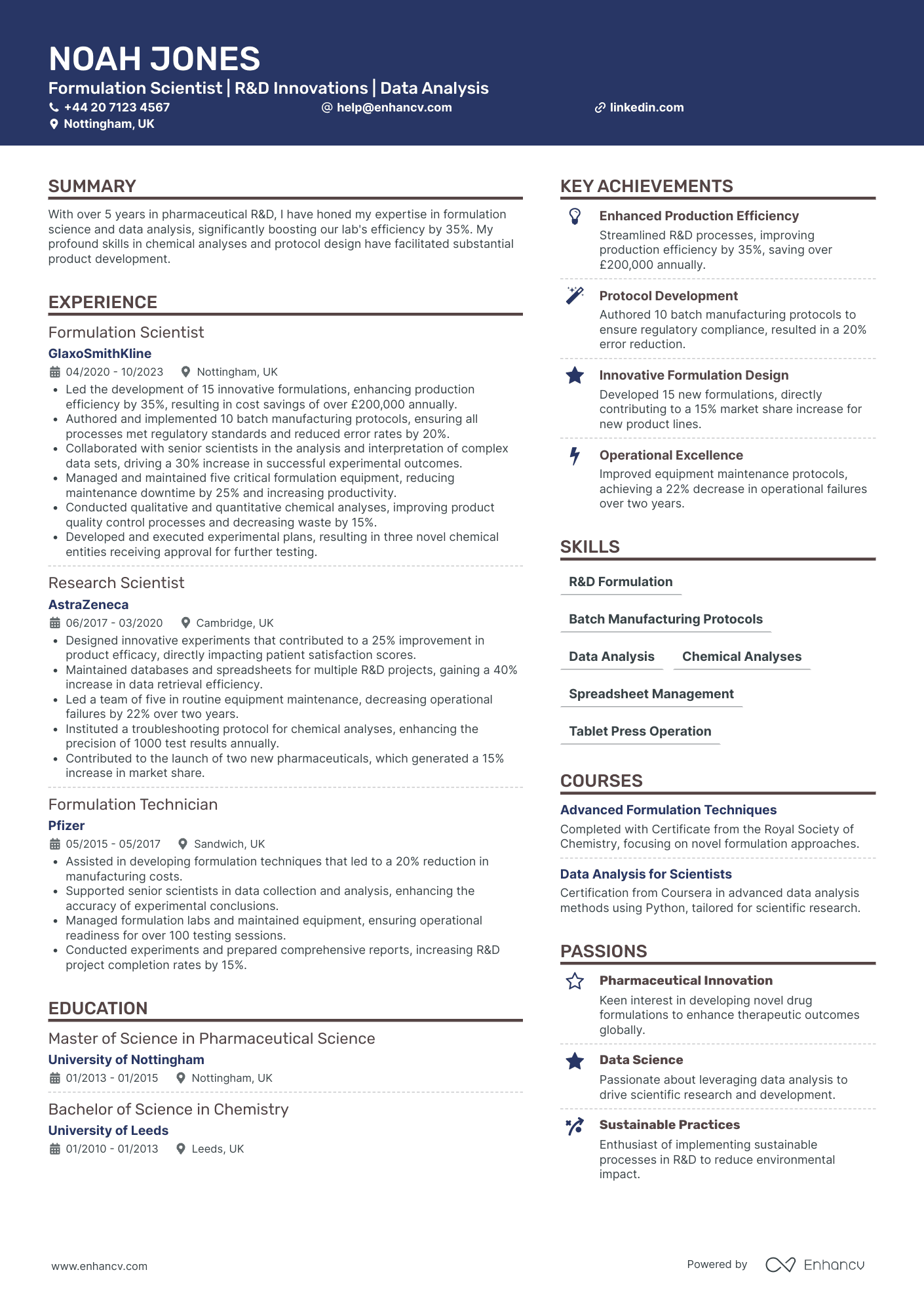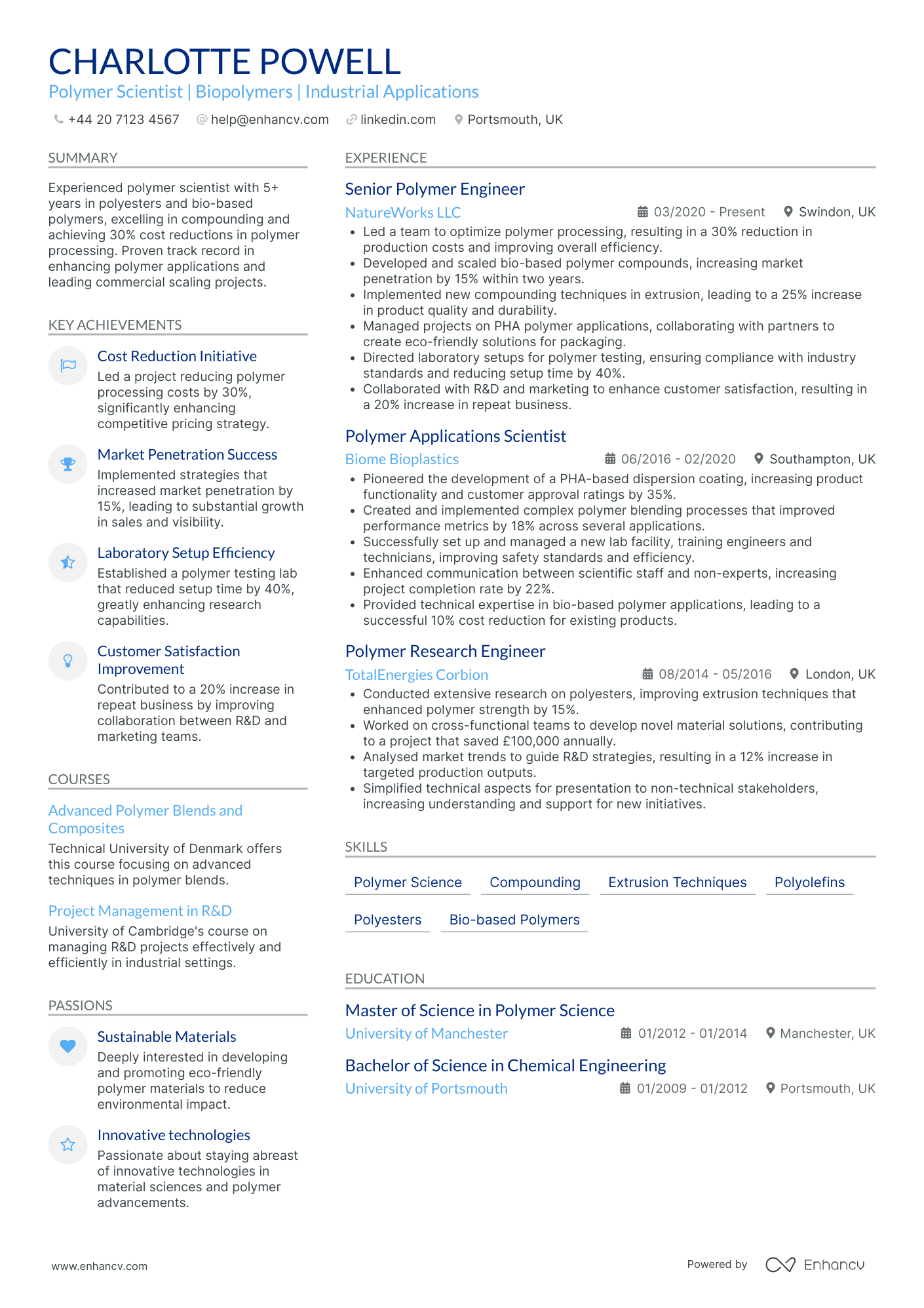Crafting a CV that effectively showcases your expertise in various chemical analysis techniques can be a daunting challenge. Our guide offers you step-by-step assistance, ensuring your skills are highlighted in a manner that captures the attention of prospective employers.
- Applying best practices from real-world examples to ensure your profile always meets recruiters' expectations;
- What to include in your work experience section, apart from your past roles and responsibilities?
- Why are both hard and soft skills important for your application?
- How do you need to format your CV to pass the Applicant Tracker Software (ATS) assessment?
If you're writing your CV for a niche chemist role, make sure to get some inspiration from professionals:
Resume examples for chemist
By Experience
Senior Research Chemist
- Comprehensive Structure and Clarity - The CV is well-organized, allowing for easy navigation through various sections such as career history, education, skills, and achievements. Each part is structured to provide concise yet detailed insights into Edward Mitchell's professional background, emphasizing both depth and breadth of his expertise in chemistry.
- Successful Career Development and Promotions - Edward Mitchell's career trajectory shows clear growth, moving from a Synthesis Chemist to a Senior Research Chemist. This progression reflects his ability to take on increasing responsibilities and his capacity for leadership within the competitive field of chemical research and development, underscoring his commitment to professional advancement.
- Strong Industry-Specific Expertise - The CV highlights Edward's technical depth in organic and polymer chemistry, showcasing his use of advanced synthesis techniques and regulatory compliance strategies. His ability to implement cutting-edge methodologies demonstrates a high level of expertise that is crucial for innovation and efficiency in the chemical industry.
By Role
Analytical Chemist
- Highly structured and detailed content presentation - Scarlett Murphy’s CV is exceptionally well-organized, presenting information with clarity and conciseness. Each section is precise, providing substantial detail without unnecessary elaboration, making it easy for readers to grasp the essential qualifications and experiences swiftly.
- Robust career trajectory with clear growth - The career path illustrated shows a well-defined progression from Associate Analytical Chemist to Senior Analytical Chemist, denoting significant career advancement. Each role transition showcases an increase in responsibility and impact, reflecting continuous professional development and recognition within the industry.
- Demonstrated expertise in specialized analytical techniques - The CV highlights strong industry-specific expertise, such as Gas Chromatography (GC) and Fourier-transform Infrared Spectroscopy (FTIR). Scarlett’s ability to leverage these advanced analytical methodologies enhances the technical depth of her profile, aligning her skills with specialized industry needs.
Chemist in Pharmaceutical Development
- Cohesive and well-structured narrative - The CV is organized in a logical and straightforward manner, beginning with personal details and a concise summary, followed by distinct sections for experience, education, skills, and achievements. Each section is clearly labeled, making it easy to navigate and ensuring that all relevant information is accessible and succinctly presented.
- Consistent career advancement in the pharmaceutical industry - Lucas Adams demonstrates steady career growth, progressing from a Chemical Production Assistant to a Pharmaceutical Operator at renowned companies like Syngenta, AstraZeneca, and GlaxoSmithKline. This trajectory highlights his increasing responsibilities and his ability to leverage his educational background in real-world scenarios, underscoring a commitment to advancing in a specialized field.
- Strong impact through industry-specific achievements - The CV includes several industry-relevant accomplishments that demonstrate Lucas's capability to implement safety and efficiency improvements. His role in enhancing production efficiency by 25% and reducing operational downtime by 15% not only provides numerical evidence of his impact but also illustrates his expertise in optimizing complex chemical processes and contributing to significant on-the-ground business improvements.
Quality Control Chemist
- Strategic Career Advancement - Sienna West's CV depicts a clear trajectory of professional growth, showcasing promotions from a Laboratory Analyst to a Senior Quality Control Chemist. This progression underscores her ability to assume higher responsibility and leadership in specialized teams within the chemistry field, highlighting both her dedication and skill enhancement over the years.
- Technical Mastery and Methodological Expertise - The CV provides a comprehensive overview of Sienna's proficiency in industry-specific tools and methodologies like FMEA, SAP, and LIMS. Her technical depth is further evidenced by her notable success in method development and her commitment to continuous professional development through courses such as Advanced Quality Control in Chemistry.
- Achievements with Significant Impact - Sienna's accomplishments are not just about metrics; they reflect meaningful business outcomes. For instance, the 25% reduction in testing time and 20% maintenance cost savings she achieved demonstrate her strategic approach to efficiency and cost management, directly impacting business productivity and sustainability in substantial ways.
Industrial Chemist
- Clear Articulation of Career Progression - Arthur’s CV narrates his career trajectory from a Chemical Research Scientist to a Senior Industrial Chemist, illustrating a logical progression and advancement in responsibility. The roles show a clear evolution in expertise, indicating an upward career path in the chemical industry with a focus on process scaleup and efficiency improvement.
- Diverse Industry-specific Experience - The CV highlights Arthur’s specialized experience in polymer chemistry and process engineering. It details methodologies such as developing scalable processes, optimizing production conditions, and implementing new production processes, showcasing technical depth and specialized knowledge crucial for an industrial chemist.
- Impact-driven Achievements with Measurable Results - The achievements section is highly impactful, underscoring significant contributions like a 30% increase in production efficiency and a 35% reduction in carbon footprint. These accomplishments are not just numeric but illustrate Arthur’s capability to drive operational excellence and sustainability within companies, echoing his passion for environmentally friendly practices.
Chemist in Food Science
- Clear and Structured Presentation - The CV is well-organized with distinct sections for experience, education, skills, and achievements, which ensures clarity. This structure allows for easy navigation and highlights pertinent details succinctly, crucial for quick scanning by potential employers.
- Progressive Career Trajectory - Samuel Campbell's career path demonstrates a clear growth trajectory, advancing from a Quality Control Technician to a Food Safety Quality Chemist. This upward movement within the industry shows both capability and ambition, reinforcing his commitment to the food safety and quality sector.
- Industry-Specific Expertise and Impact - The CV showcases industry-specific contributions, such as developing quality assurance systems and optimizing production processes, backed by substantial impact like a 25% reduction in waste. These accomplishments reflect deep technical knowledge and a proactive approach to problem-solving within the food safety domain.
Chemist in Environmental Science
- Strong Technical Proficiency and Adaptability - George Johnson's CV highlights his expertise in advanced laboratory equipment and software like GCMS and Agilent MassHunter, showcasing his technical depth. His adaptability is demonstrated by his successful transition from using instrumentation software to optimizing it, which improved data processing efficiency by 20%.
- Progressive Career Development - The CV outlines a clear career trajectory, moving from a Laboratory Technician at SGS to an Environmental Chemist at ALS Environmental. This progression emphasizes his continual growth in responsibility, skills, and leadership, illustrated by his advancement from sample preparation to leading air quality projects.
- Impactful Achievements with Business Relevance - Johnson's achievements section emphasizes impactful contributions like developing a new sampling methodology that reduced analysis time by 30%. This not only demonstrates innovation but also has real-world relevance by enhancing project turnaround times and lab efficiency, thus contributing positively to the business.
Forensic Chemist
- Structured and Clear Content Presentation - Oliver's CV is well-organized, presenting information in a clear and concise manner. Each section is logically divided, making it easy for the reader to follow his career progression and achievements. The inclusion of bullet points under each job role effectively highlights specific responsibilities and accomplishments, ensuring that key information is quickly accessible.
- Career Trajectory with Consistent Growth - Oliver's career path demonstrates steady growth and an impressive depth of experience in forensic analysis and chemical analysis. From starting as a Research Chemist at AstraZeneca to his current role as a Forensic Laboratory Technician at Eurofins, he has transitioned into positions with increasing responsibility, showcasing a commitment to professional development and expertise in his field.
- Unique Emphasis on Industry-Specific Skills - The CV highlights Oliver's technical depth by mentioning specific methodologies such as calibration techniques and chemical analyses. His experience with forensic tools and his ability to implement new testing procedures are directly relevant to his role as a forensic analyst, proving his technical proficiency and ability to contribute meaningfully to his field.
Chemist in Material Science
- Structured Career Development - Max Wright's career trajectory is marked by a consistent upward movement, evident from promotions from Assistant Research Scientist to Senior Materials Scientist. This growth underscores his ability to take on increasing responsibilities and deliver significant results at industry-leading companies such as Unilever and Reckitt Benckiser.
- Expertise in Polymer Synthesis - The CV highlights Wright's distinctive proficiency in polymer materials and synthesis, a niche yet critical area within inorganic chemistry. His development of innovative polymer synthesis methods, which improved product durability by 30%, showcases his deep technical knowledge and contributions to consumer goods' advancements.
- Leadership in Multidisciplinary Teams - Max's role in leading cross-functional teams and mentoring junior scientists showcases a strong capability in team leadership and collaboration. By fostering a culture of continuous learning and significantly boosting team productivity, he exemplifies effective leadership qualities crucial for driving innovation and achieving strategic objectives.
Organic Chemist
- Structured Career Path - Sienna West has showcased a clear trajectory of growth and advancement within the polymer industry. Progressing from a Polymer Research Scientist to a Senior Polymer Chemist within prominent companies signifies a dedicated and focused career path, reflecting a deepening of expertise and increasing responsibility in research and development.
- Technical Acumen and Innovation - The CV is infused with industry-specific accomplishments, such as the development of a new biocompatible polymer and the authoring of influential scientific papers. This not only highlights Sienna's technical depth but also her capacity for innovation and contributions to key advancements within the polymer chemistry domain.
- Cross-functional Leadership and Collaboration - Sienna’s ability to manage cross-functional teams and mediate between R&D and quality assurance departments speaks to her strong leadership and collaborative skills. Her efforts resulted in enhanced project timelines and improved manufacturing outputs, demonstrating her role as an integrative leader capable of driving substantial business impact.
Inorganic Chemist
- Content Presentation Excellence - The CV is structured clearly and concisely, presenting information in a logical progression. This makes it easy for the reader to identify significant career milestones and achievements quickly. The use of bullet points in the experience section enhances readability and helps focus on key accomplishments.
- Career Growth in Quality Control - Daniel Baker's career trajectory shows a clear progression from Laboratory Technician to Senior Quality Control Analyst, highlighting a commitment to growth and excellence within the pharmaceutical industry. Each role reflects a step up in responsibility and expertise, showcasing a consistent career path in animal health pharmaceuticals.
- Technical Proficiency in Industry-Specific Tools - The CV demonstrates deep technical expertise with tools and methodologies crucial to animal pharmaceuticals, such as ICP-MS and FDA GMP standards. The inclusion of specific courses like "Advanced ICP-MS Techniques" illustrates a dedication to staying current with industry developments, enhancing technical depth.
Chemist in Polymer Science
- Structured Path in Polymer Chemistry - Isla King's career trajectory showcases a clear and structured advancement within the field of polymer chemistry. Transitioning from a Polymer Engineer to a Lead Scientist with substantial experience in renowned companies like AkzoNobel, Unilever, and Croda International, it reflects a consistent focus on sustainable materials and polymer innovation, demonstrating progression and expertise in her chosen field.
- In-depth Technical Expertise - The CV highlights numerous industry-specific tools and methodologies, such as advanced rheological and FTIR protocols, underpinning Isla's technical depth in polymer characterisation. Her ability to integrate cross-disciplinary knowledge from molecular biology and chemical engineering further underscores her proficiency in developing innovative biodegradable polymers.
- Leadership and Mentorship - Isla’s experience in providing technical mentorship to junior scientists and spearheading cross-functional collaborations demonstrates her strong leadership skills. By fostering a culture of innovation and guiding teams towards achieving crucial R&D goals, she proves her capability to inspire and shape the next generation of polymer scientists while promoting sustainability in product development.
Medicinal Chemist
- Effective Content Organization - The CV is methodically structured with clear sections that make navigation effortless. Each section, from work experience to education, is concisely presented which allows the hiring manager to quickly access relevant information and understand the candidate's qualifications without being overwhelmed by unnecessary details.
- Progressive Career Trajectory - Daniel Baker's career shows significant growth, starting from an Organic Chemist at Pfizer to a Medicinal Chemist at AstraZeneca. This trajectory highlights a deepening expertise and increased responsibility, demonstrating a consistent upward trend in the pharmaceutical industry, underscoring his development into leadership roles.
- Industry-Specific Mastery - The CV showcases Daniel’s proficiency in using advanced in-silico modelling techniques and his ability to design novel synthetic pathways, emphasizing technical depth unique to medicinal chemistry. This indicates his capability to employ cutting-edge methodologies that are crucial in drug discovery and development, setting him apart from less specialized peers.
Biochemist
- Comprehensive Leadership and Management Skills - The CV highlights Oscar Evans' ability to lead and manage a team effectively. It showcases a successful track record of increasing team performance by 30% and establishing a training program that reduced onboarding times by 25%, demonstrating strong leadership and strategic management capabilities.
- Dynamic Career Growth and Specialization - Oscar's career trajectory showcases significant growth from a Biomedical Scientist Trainee to a Clinical Scientist, reflecting a deepening specialization in Clinical Biochemistry. This progression not only reflects increasing responsibilities but also underscores his ability to adapt and advance within the healthcare industry.
- Focused on Innovations with Real-World Impact - The CV effectively highlights industry-specific innovations, such as the development of new testing protocols and methods. By implementing innovative testing techniques, Oscar directly improved diagnostic accuracy and enhanced patient outcomes by 15%, illustrating a commitment to forward-thinking solutions in clinical settings.
Physical Chemist
- Structured Presentation with Distinct Sections - Emily Cox's CV is well-organized, presenting her career milestones and skills in distinct, clearly defined sections. This allows the reader to quickly grasp her qualifications and experience. The use of concise bullet points under each position helps to emphasize her key responsibilities and achievements without overwhelming detail, maintaining clarity throughout.
- Progression Through Influence and Impact - Cox's career trajectory shows significant growth, particularly through her increasing leadership roles and responsibilities. Moving from a Postdoctoral Research Fellow to Assistant Professor, her journey is marked by impactful contributions such as securing substantial research funding and improving student outcomes. Her roles consistently reflect an upward trajectory not just in titles but in the scale of her impact.
- Innovation in Chemistry Education - The CV emphasizes unique industry-specific elements, particularly through Cox's use of innovative teaching methods and cross-disciplinary collaborations. Her involvement in securing major grants and enhancing lab efficiency reveals a deep technical understanding and application in chemistry, while the adaptation of green chemistry practices highlights her commitment to sustainable scientific advancement.
Chemist in Petrochemicals
- Concise and Well-Structured Presentation - The CV's format is highly organized, presenting each section clearly with relevant and coherent details. The use of bullet points under each job title succinctly highlights key responsibilities and accomplishments, enhancing readability and allowing quick assimilation of information.
- Impressive Career Progression in Renowned Companies - Harper Webb shows a strong career trajectory with progressive roles in major pharmaceutical companies such as GlaxoSmithKline, AstraZeneca, and Pfizer. This trajectory demonstrates growth through advancement to senior positions, reflecting proven competence and leadership capabilities within the industry.
- Mastery of Industry-Specific Analytical Techniques - The CV emphasizes Harper's technical depth by detailing proficiency in advanced analytical techniques, including HPLC, GC, UV, and IR. Their mastery of these methodologies is further highlighted by achievements such as improving lab protocol efficiencies and implementing robust testing protocols to expedite results delivery.
Chemist in Cosmetics
- Clear Career Progression - Max Wright's CV illustrates a robust career trajectory within the cosmetics industry, showcasing a steady rise from a Formulation Chemist to a Senior Chemist position at L'Oréal. This progression not only highlights the candidate's ability to grow and adapt within the field but also underscores their increasing level of responsibility and expertise over time.
- Alignment with Industry-Specific Methodologies - The CV stands out by demonstrating proficiency in essential industry tools and methodologies such as GMP and CoSHH, which are critical in the cosmetics field. Additionally, Max's experience with proprietary systems like COPTIS reflects a deep technical understanding that is highly valued in cosmetic science.
- Impactful Achievements - The CV places strong emphasis on performance and impact, detailing significant achievements like spearheading a product line that increased market share by 15%, and leading a sustainability initiative that reduced environmental impact by 40%. These accomplishments not only highlight the candidate's capability to achieve business objectives but also underscore their commitment to sustainable practices.
Chemist in Paints and Coatings
- Structural Clarity and Conciseness - The CV features a well-organized structure with clear sections that make it easy to navigate. With succinct bullet points and thoughtfully curated information, the document conveys the candidate's key accomplishments and skills without overwhelming the reader.
- Dynamic Career Progression - Showcasing a robust career trajectory, the CV illustrates significant growth within the coatings industry. Charlie Thomas has advanced from a Research Chemist to a Senior Research Scientist, highlighting promotions that reflect an elevation in responsibilities and leadership roles while consistently staying within the relevant sector.
- Technical Mastery and Methodologies - Industry-specific elements such as expertise in Optiva and SAP, along with advanced data analytics techniques, underscore the candidate's technical proficiency. These tools and methodologies demonstrate a deep technical understanding and an ability to drive innovation in the coatings field.
Chemist in Dyes and Pigments
- Structured Presentation - The CV is organized in a clear and logical manner, making it easy for any recruiter to quickly glean the essential information. The sections are well-labeled, and each job role is accompanied by precise dates, highlighting a chronological career progression. The bullet points are concise yet informative, presenting achievements and responsibilities without overwhelming details.
- Career Growth and Stability - The career trajectory of Noah Jones showcases a consistent growth path in the pharmaceutical industry. Starting as a Formulation Technician at Pfizer and advancing to a Formulation Scientist at GlaxoSmithKline reflects a steady rise in responsibility and expertise. This progression demonstrates his dedication to the field and his ability to thrive in various roles within renowned companies.
- Technical Depth and Innovation - Unique industry-specific elements highlighted in Noah's CV include advanced formulation techniques and data analysis, emphasizing his technical dexterity and innovation in pharmaceutical R&D. His skills in developing new formulations and batch manufacturing protocols underscore his capacity to drive product development and operational excellence within the industry.
Chemist in Plastics and Polymers
- Clear focus on industry-specific expertise - The CV effectively highlights Charlotte Powell's specialized knowledge in polymer science and biopolymers, underscoring her technical depth with references to specific polymer types like polyesters and PHA. This focus assures prospective employers of her expertise in relevant industrial applications.
- Progressive career development and leadership - The trajectory from a Polymer Research Engineer to a Senior Polymer Engineer illustrates a clear path of growth and increased responsibility. Her leadership abilities are evidenced by her experience in managing teams, directing laboratory setups, and collaborating with cross-functional teams to enhance customer satisfaction.
- Impact-driven achievements with business relevance - The CV vividly captures the business impact of Charlotte's work, detailing initiatives that led to significant cost reductions, market penetration increases, and improved product quality. These results not only highlight her skill set but also demonstrate her ability to contribute to the company's strategic goals and bottom line.
Structuring your chemist CV layout: four factors to keep in mind
There are plenty of best practices out there for your CV layout and design. At the end of the day, a clear format and concise CV message should be your top priority. Use your CV design to enhance separate sections, bringing them to the forefront of recruiters' attention. At the same time, you can write content that:
- Follows the reverse chronological order in the experience section by first listing your most recent jobs;
- Incorporates your contact information in the header, but do skip out on the CV photo for roles in the UK;
- Is spotlighted in the most important sections of your CV, e.g. the summary or objective, experience, education, etc. to show just how you meet the job requirements;
- Is no longer than two-pages. Often, the one-page format can be optimal for your chemist CV.
Before submitting your CV, you may wonder whether to export it in Doc or PDF. With the PDF format, your information and layout stay intact. This is quite useful when your CV is assessed by the Applicant Tracker System (or the ATS) . The ATS is a software that scans your profile for all relevant information and can easily understand latest study on the ATS , which looks at your CV columns, design, and so much more.
PRO TIP
Be mindful of white space; too much can make the CV look sparse, too little can make it look cluttered. Strive for a balance that makes the document easy on the eyes.
The top sections on a chemist CV
- Education history is paramount to showcase your formal training and qualifications in chemistry which is critical for understanding the theoretical background required for the role.
- Laboratory skills and techniques should be highlighted to demonstrate practical experience and mastery in conducting experiments and analyses which are typically central to the role of a chemist.
- Research experience is necessary to illustrate your ability to design, conduct, and analyse scientific studies which is a cornerstone of many chemistry-related jobs.
- Publications and presentations section shows your contribution to the scientific community and your ability to communicate complex information, an important aspect for many chemist positions.
- Professional affiliations and memberships indicate your involvement and recognition within the chemical science community, suggesting a commitment to professional development and networking.
What recruiters value on your CV:
- Highlight your relevant qualifications, including your degree(s) in Chemistry or related fields, and any postgraduate research you have undertaken. Employers look for a strong educational background in chemistry, specifically any specialised areas that align with the role.
- Detail your hands-on laboratory experience, including techniques such as chromatography, spectroscopy, or titration that you are proficient in. Practical laboratory skills are critical for chemists, so showcase your expertise and any advanced equipment you can operate.
- Include any publications or research you've been a part of, especially if they are peer-reviewed or involve novel findings. Scientific contributions demonstrate your ability to advance knowledge in the field of chemistry.
- Emphasise your proficiency with chemical software and any relevant data analysis tools like ChemDraw, LabWare LIMS, or MATLAB. Modern chemistry roles often require digital literacy and the ability to analyse complex data sets.
- Present any industry-specific experience, such as pharmaceuticals or petrochemicals, and mention your understanding of the regulations and compliance standards in those industries. Sector-specific expertise can set you apart from other candidates and shows employers your real-world application of chemistry knowledge.
Recommended reads:
Tips and tricks on writing a job-winning chemist CV header
The CV header is the space which most recruiters would be referring most often to, in the beginning and end of your application. That is as the CV header includes your contact details, but also a headline and a professional photo. When writing your CV header:
- Double-check your contact details for spelling errors or if you've missed any digits. Also, ensure you've provided your personal details, and not your current work email or telephone number;
- Include your location in the form of the city and country you live in. If you want to be more detailed, you can list your full address to show proximity to your potential work place;
- Don't include your CV photo, if you're applying for roles in the UK or US, as this may bias initial recruiters' assessments;
- Write a professional headline that either integrates the job title, some relevant industry keywords, or your most noteworthy achievement.
In the next part of our guide, we'll provide you with professional CVs that showcase some of the best practices when it comes to writing your headline.
Examples of good CV headlines for chemist:
- Analytical Chemist | PhD in Analytical Chemistry | Expert in Spectroscopy and Chromatography | 8 Years Experience
- Senior Research Chemist | Lead Drug Discovery Projects | MSc Organic Chemistry | Process Optimization Specialist | 12+ Years
- Clinical Biochemist | NHS Specialist | Clinical Diagnostics and Enzymology | Chartered Scientist | 6 Years Expertise
- Industrial Chemical Engineer | PhD | Process Safety and Sustainable Development | Chartered Member IChemE | 10 Years
- Junior Synthetic Chemist | MChem With Merit | Polymer Synthesis and Material Science | 2 Years Professional Practice
- Principal Formulation Chemist | Cosmetics and Personal Care | PhD Physical Chemistry | Innovations & IP Strategy | 15 Years
Opting between a chemist CV summary or objective
Within the top one third of your chemist CV, you have the opportunity to briefly summarise your best achievements or present your professional goals and dreams. Those two functions are met by either the CV summary or the objective.
- The summary is three-to-five sentences long and should narrate your best successes, while answering key requirements for the role. Select up to three skills which you can feature in your summary. Always aim to present what the actual outcomes were of using your particular skill set. The summary is an excellent choice for more experienced professionals.
- The objective is more focused on showcasing your unique value as a candidate and defining your dreams and ambitions. Think about highlighting how this current opportunity would answer your career vision. Also, about how you could help your potential employers grow. The objective matches the needs of less experienced candidates, who need to prove their skill set and, in particular, their soft skills.
Still not sure about how to write your CV opening statement? Use some best industry examples as inspiration:
CV summaries for a chemist job:
- Accomplished analytical chemist with over 10 years of experience in the pharmaceutical industry, adept at chromatography and spectroscopy. Successfully developed and patented a novel compound that reduced production costs by 18%. Eager to apply expertise in the synthesis programme at a dynamic London research institute.
- Seasoned organic chemist specialised in polymer synthesis, drawing on a 12-year career with a leading chemical manufacturer. Demonstrated mastery in NMR analysis, leading to the creation of a new biodegradable plastic that revolutionised the packaging industry. Pursuing to foster impactful innovations in environmental chemistry.
- Former medical professional transitioning into chemical research, with a strong foundation in biochemistry and 5 years of experience in laboratory diagnostics. Proficient in analytical techniques and eager to apply medical knowledge to advance chemical understanding and contribute to groundbreaking health-related chemical studies.
- Software engineer with 7 years of expertise in developing simulation tools for chemical processes, aiming to pivot into applied chemical research. Brings strong computational skills and in-depth knowledge of reaction modelling to bridge the gap between technology and chemistry in a research-centric environment.
- Keen to embark on a career in analytical chemistry, bringing a fresh perspective and a strong commitment to learning advanced spectroscopic and chromatographic methods. Aims to leverage academic background in chemistry and a passion for problem-solving to support research and innovation in a hands-on laboratory setting.
- Aspiring to join the field of organic chemistry, with a degree in biochemistry and a genuine curiosity about molecular interactions. Intent on utilising methodical research skills and a detail-oriented approach to contribute to the synthesis and development of organic compounds, whilst acquiring valuable practical experience.
The best formula for your chemist CV experience section
The CV experience section is the space where many candidates go wrong by merely listing their work history and duties. Don't do that. Instead, use the job description to better understand what matters most for the role and integrate these keywords across your CV. Thus, you should focus on:
- showcasing your accomplishments to hint that you're results-oriented;
- highlighting your skill set by integrating job keywords, technologies, and transferrable skills in your experience bullets;
- listing your roles in reverse chronological order, starting with the latest and most senior, to hint at how you have grown your career;
- featuring metrics, in the form of percentage, numbers, etc. to make your success more tangible.
When writing each experience bullet, start with a strong, actionable verb, then follow it up with a skill, accomplishment, or metric. Use these professional examples to perfect your CV experience section:
Best practices for your CV's work experience section
- Developed and optimised synthetic pathways for new pharmaceutical compounds, resulting in a 20% increase in laboratory efficiency and patenting of two novel drugs.
- Implemented rigorous quality control measures in line with ISO 9001 standards, leading to a 15% reduction in product inconsistencies and a significant enhancement in safety protocols.
- Expertly utilised analytical techniques such as HPLC, NMR, and mass spectrometry for the characterisation of chemical entities, ensuring 98% accuracy in molecular identification.
- Authored and co-authored 10 peer-reviewed journal articles on organic synthesis and reaction mechanisms, establishing a strong presence within the scientific community.
- Designed and conducted experiments for scale-up processes, improving yield from 50 to 90 grams while maintaining product purity of over 95%.
- Collaborated with cross-functional teams including biologists and pharmacologists in multi-disciplinary projects, resulting in the accelerated development of three lead compounds.
- Managed a team of junior chemists and technicians, providing mentorship and training that improved overall team performance and laboratory safety standards.
- Conducted comprehensive literature reviews to stay current with industry trends and technologies, leading to the adoption of innovative approaches in catalyst design.
- Maintained stringent adherence to environmental and disposal regulations, significantly reducing chemical waste and promoting sustainability in the laboratory.
- Conducted analysis of chemical compounds and synthesized over 100 small molecules for drug discovery projects, leading to two patents.
- Improved the throughput of the chemistry lab by 20% by implementing lean laboratory principles, reducing waste and increasing experimental efficiency.
- Spearheaded the development and validation of analytical methods using HPLC and GC, which became the standard protocols for product quality assessment.
- Leading a team of 15 chemists and technicians in the development of new agricultural chemicals, achieving a reduction in product development time by 30%.
- Direct involvement in strategic partnership with cross-functional teams, resulting in the launch of a novel pesticide that captured 10% market share within its first year.
- Pioneered the use of machine learning algorithms for predicting chemical reactions, which enhanced the accuracy of compound design by 40%.
- Optimized chemical processes for large-scale production, reducing raw material costs by 15% while maintaining product quality.
- Developed and instituted a comprehensive waste reduction program that saved the company $200,000 annually and decreased hazardous waste output by 25%.
- Collaborated with multi-disciplinary teams to deliver a new polymer blend for automotive applications, increasing thermal resistance and extending product lifespan.
- Managed and executed analytical method development for over 80 generic pharmaceutical products, enhancing the drug approval rate by 35%.
- Provided technical expertise in troubleshooting and resolving complex analytical issues, which decreased downtime by 50% and improved laboratory productivity.
- Authored 5 peer-reviewed publications and presented research findings at international chemical industry conferences, positioning the company as a thought leader in pharmaceutical analytics.
- Implemented a novel quality control protocol utilizing spectroscopic techniques, improving detection limits of impurities by tenfold and ensuring product compliance.
- Led the transition to green chemistry practices in product formulation, reducing VOC emissions by 40% and enhancing the company's sustainability profile.
- Mentored and trained junior chemists, enhancing team capabilities and fostering a culture of continuous improvement and knowledge sharing.
- Developed new synthetic routes for active pharmaceutical ingredients (APIs), which reduced production costs by 25% without compromising on potency or safety.
- Executed in-depth kinetic studies on chemical reactions that were critical to improving product yield by 20%.
- Orchestrated the scale-up of benchtop chemistry to pilot plant, delivering consistent product quality and paving the way for successful commercial batches.
- Rolled out a new laboratory information management system (LIMS) that increased data integrity and operational efficiency by streamlining sample tracking and result recording.
- Engaged in cross-functional collaboration with engineering and product teams to develop coatings with improved abrasion resistance, capturing an additional 5% of the market share.
- Successfully managed regulatory submissions for new chemical entities, resulting in approval of 3 new drugs by the FDA.
- Coordinated with external contract research organizations (CROs) to outsource specialized chemical analyses, reducing project timelines by an average of 20%.
- Championed the adoption of ultra-high-pressure liquid chromatography (UHPLC), which improved resolution and decreased run times for complex mixtures by up to 50%.
- Conducted a comprehensive review of laboratory safety protocols, resulting in a 60% reduction in laboratory incidents and enhanced compliance with OSHA standards.
- Influenced the design of a new catalyst system that increased the efficiency of petrochemical reactions by 15%, contributing to a significant cost reduction in production.
- Tailored a suite of chemical tests for new product lines, ensuring that each met stringent quality criteria while also enhancing turnaround time by 40%.
- Played a key role in a collaborative project with a major automobile manufacturer, developing a new fuel additive that improved engine performance and reduced emissions.
- Led the formulation team in the creation of a new cosmetic line, which resulted in an increased customer base by 25% due to the hypoallergenic properties.
- Oversaw the laboratory accreditation process, achieving ISO 17025 certification and enhancing the credibility and accuracy of testing results.
- Developed training programs on laboratory techniques and safety, which improved overall team performance and reduced procedural errors by over 30%.
Lacking professional expertise: how to write your CV to highlight your best talents
Don't count on your lucky stars when you're applying for a role, where you happen to have less (or almost none) professional experience. Recruiters sometimes do hire inexperienced candidates if they're able to present their unique value from the get-go. So, instead of opting for the traditional, CV experience section:
- List any applicable expertise you happen to have - no matter if it's a part-time job, internship, or volunteer work. This would hint to recruiters that your profile is relevant;
- Focus your CV on your transferrable skills or talents you've obtained thanks to your whole life and work experience. In effect, you'll be spotlighting your value as a candidate;
- Separate more space for your applicable academic background and certificates to show you have the technical know-how;
- Ensure that within your objective, you've defined why you'll like the job and how you'll be the perfect match for it. Always ensure you've tailored your CV to individual applications.
Looking for more good examples for your first job? We'll show you how other candidates, with less professional experience, have created their job-winning CVs.
Recommended reads:
PRO TIP
Talk about any positive changes you helped bring about in your previous jobs, like improving a process or helping increase efficiency.
Hard skills and soft skills to showcase your unique skill set on your chemist CV
Did you know that your CV will mostly likely be assessed by recruiters based on skill alignment? And that means that the way you feature your key skills across different CV sections will play a crucial role in landing you that first interview. We recommend you add your:
- technical capabilities or hard skills in your CV experience, certificates, projects, etc. Use your past accomplishments to prove your technical capabilities. List up to a dozen different software or hardware in your dedicated skills section to match the job keywords;
- personal and communication skills or soft skills in your CV strengths, achievements, summary/ objective, etc. Soft skills are a bit more difficult to prove. How do you define your aptitude in active listening? So, instead of just listing the skill name, include a tangible metric to show your success.
On a final note, when you're in a hurry to create your profile, you may misspell a particular technology or soft skill. That's why we suggest you copy and paste the particular skill name (or keyword), directly from the job advert. This would also help you to pass any initial Applicant Tracker System (ATS) tests.
Top skills for your chemist CV:
Analytical Chemistry
Spectroscopy
Chromatography
Wet Chemistry
Laboratory Safety
Chemical Synthesis
Quality Control
Data Analysis
Material Science
Biochemistry
Attention to Detail
Problem-Solving
Time Management
Communication
Teamwork
Critical Thinking
Adaptability
Organisational Skills
Project Management
Creativity
PRO TIP
Use mini case studies or success stories in your CV to demonstrate how your skills have positively impacted previous roles or projects.
Your university degree and certificates: an integral part of your chemist CV
Let's take you back to your uni days and decide what information will be relevant for your chemist CV. Once more, when discussing your higher education, select only information that is pertinent to the job (e.g. degrees and projects in the same industry, etc.). Ultimately, you should:
- List only your higher education degrees, alongside start and graduation dates, and the university name;
- Include that you obtained a first degree for diplomas that are relevant to the role, and you believe will impress recruiters;
- Showcase relevant coursework, projects, or publications, if you happen to have less experience or will need to fill in gaps in your professional history.
PRO TIP
If there's a noticeable gap in your skillset for the role you're applying for, mention any steps you're taking to acquire these skills, such as online courses or self-study.
Recommended reads:
Key takeaways
Write your professional chemist CV by studying and understanding what the role expectations are. You should next:
- Focus on tailoring your content to answer specific requirements by integrating advert keywords through various CV sections;
- Balance your technical know-how with your personal skills to showcase what the unique value would be of working with you;
- Ensure your CV grammar and spelling (especially of your key information and contact details) is correct;
- Write a CV summary, if your experience is relevant, and an objective, if your career ambitions are more impressive;
- Use active language by including strong, action verbs across your experience, summary/objective, achievements sections.
